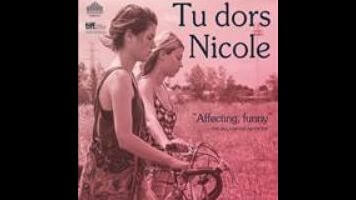Tu Dors Nicole is a summer movie about the melancholy tedium of summer

“Is this gonna be our summer?” the title character of Tu Dors Nicole asks her best friend, Véronique (Catherine St-Laurent), as they trudge aimlessly through a field, struggling to fill the hours of a sweltering afternoon. In the immortal words of Joey Ramone, they have nothing to do and nowhere to go. Boredom, a dirty secret of early twentysomething life, has ridden in on the crest of a heat wave. Or maybe it’s just restlessness, the cold sweats of uncertainty. For Nicole (Julianne Côté), 22 and fresh out of college, the lazy downtime of the warmer weeks is no longer a brief respite from life’s responsibilities. It’s a new status quo. And without the road map school provided, summer just looks like a long sprawl into the unknown, an uneventful vacation with no end in sight.
Shot on gorgeous black-and-white 35 mm that only seems to enhance the melancholic drabness of the events it depicts, Tu Dors Nicole is an especially wispy, French-Canadian addition to an irresistible genre: the last-summer-of-adolescence movie, in which some clueless youth begins to pass slowly out of childhood, perhaps without really noticing. The film spans a few low-impact weeks in the company of its heroine, as she foolishly obtains (and maxes out) a credit card, plans a trip to Iceland she probably won’t take, casually steals from the thrift store that employs her, gradually grows apart from Véronique, and—despite the title, which translates to “You’re sleeping Nicole”—wrestles with nightly bouts of insomnia. It’s a series of lovely and/or faintly comic vignettes, animated by the perfectly ordinary charm of its young star.
Because of its focus on waning female friendship, the movie has earned early comparisons to Ghost World and Frances Ha, two high-water marks of the genre. (“We’re like an old couple,” Nicole says of her bond with Véronique, which is exactly how Greta Gerwig’s Frances described her own platonic love story.) But Tu Dors Nicole makes those earlier films look like roller-coaster rides by comparison; its own vision of delayed maturation operates in an even gentler, more mundane register. The closest the movie comes to a big dramatic conflict is the crush Nicole develops on JF (Francis La Haye), the laid-back new drummer her old brother Rémi (Marc-André Grondin) recruits for his band. Writer-director Stéphane Lafleur handles this plot development beautifully, allowing the two characters to tiptoe around each other in a way that feels true to the realities of nursing—and deflating—an infatuation.
There are also a few sporadic spikes of whimsy, most notably in the repeat appearance of a smitten preteen, Martin (Godefroy Reding), with a prematurely deep voice and the soul of a poet. “The heart has no age,” he tells Nicole, in a futile attempt to win her affection; it’s the broadest this very modest coming-of-age story is willing to go. The character fits, anyway, into the movie’s spectrum of dissatisfaction: While Martin yearns for what he doesn’t yet possess—the pleasures and sophistication of adulthood— Rémi mourns what he’s losing, the band that will probably dissolve when his guitarist becomes a father by summer’s end. Nicole is caught between these two poles, in the static purgatory of post-academia, unable to see the carefree life she once lived or the presumably livelier, more meaningful one that awaits her. Even minor movies, scaled down to the dimensions of everyday disappointment, can touch on major truths.